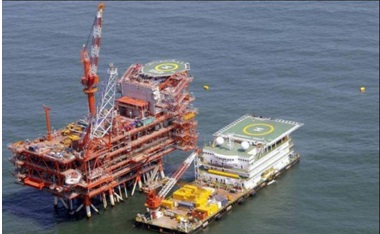

Context : The R cluster, along with the Satellite Cluster and MJ gas fields in the Krishna Godavari Basin are expected to produce around 30 MMSCMD of natural gas or about 15% of India’s projected demand for natural gas by 2023.
Background : Production of gas from the R cluster was expected to start in May 2020 but was delayed due to the impact of the Covid-19 pandemic.
Reliance Industries Ltd and British Petroleum (BP) have announced the start of gas production from the R cluster, the deepest off-shore gas field in Asia. The field is the first of three deepwater gas projects in the KGD6 block jointly developed by RIL and BP to come onstream. RIL has a participating interest of 66.7% in the KG-D6 block and BP has a participating interest of 33.3% in the block.
National Importance
The R cluster, along with the Satellite Cluster and MJ gas fields in the Krishna Godavari Basin are expected to produce around 30Million standard cubic metres per day (MMSCMD) of natural gas or about 15% of India’s projected demand for natural gas by 2023. The R cluster field alone is expected to have a peak production of 12.9 MMSCMSD or about 10% of India’s current natural gas output. In FY20, demand for natural gas in India was around 153 MMSCMD around half of which is met through imports.
RIL and BP are jointly set to invest a total of Rs 40,000 crore on these three fields. Production of gas from the R cluster was expected to start in May 2020 but was delayed due to the impact of the Covid-19 pandemic. The satellite cluster is expected to start production in the next fiscal.
Impact on the India’s Energy Security efforts
Gas tariff boost
According to experts, recent changes in the formula for gas transport tariffs are likely to benefit Reliance and BP’s investments in these three fields. The regulations move away from the existing system which charges consumers based on the distance from the source of gas and the number of pipelines used to a unified gas tariff system through with one tariff for gas transported within 300 kms and another tariff for gas transported beyond 300 kms from the source of the natural gas.
The move which is aimed at making natural gas more affordable to customers in the hinterland will likely benefit Reliance as most of the customers for the gas from the fields in the KG-D6 basin would be well beyond 300 km away. The experts noted that the lower transport tariffs will boost Reliance’s ability to charge for gas.
Connecting the Article
Question for Prelims : Consider the following statements regarding India’s Energy Security efforts:
1. Regulations move away from the existing system of user-basedcharges.
2. Reliance has ceased production from the D1D3 and MA fields in the KG-D6 block.
Which of the Statements given above is/are correct?
(a) 1 only
(b) 2 only
(c) Both 1 and 2
(d) Neither 1 nor 2
Question for Mains : Recent changes in the formula for gas transport tariffs are likely to benefit companies’investments in the gas basins. Discuss.

Our support team will be happy to assist you!
